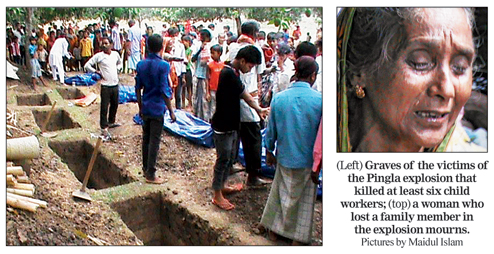
New Delhi, May 13: Children aged below 14 cannot be employed, barring some exceptions, and the punishment for violations can go up to three years in jail, according to a bill cleared by the cabinet for overhauling child labour laws.
The existing laws prevent the employment of children aged between 9 and 14 in only 18 specified occupations and 65 processes and regulates the conditions of work elsewhere.
A new definition of adolescent has also been introduced to prohibit the employment of teenagers aged between 14 and 18 in hazardous jobs, a government statement said.
However, in the absence of enforcement, laws alone cannot stop child labour. Although fireworks fall in the category in which child labour is prohibited, several children were among those killed in an explosion in an illegal cracker factory at Pingla in West Midnapore last week.
"In Bengal, the labour department does nothing to enforce even the existing laws," West Bengal Commission for the Protection of Child Rights chairman Ashokendu Sengupta said.
"Children of migrant workers, especially those employed in brick kilns and the transport sector, do not enjoy their childhood. I welcome the amendments but not only will they have little impact on the ground, but loopholes like 'after-school hours' may also be exploited."
If the new bill is passed unchanged, children younger than 14 will be allowed to work only in non-hazardous family enterprises, TV serials, films, advertisements and sporting activities (except circus). There will also be a condition that the children can work only after school hours.
The bill also proposes to make child labour a cognisable offence, which means arrests can be carried out without a warrant. The fine will also be increased to up to Rs 50,000 on the employers.
The amendments to the Child Labour (Prohibition and Regulation) Act has, however, relaxed the penal provisions for parents or guardians, who were earlier subjected to same punishments as applicable to the employer of the child.
The amendment bill, approved by the cabinet chaired by Prime Minister Narendra Modi, suggests no punishment for parents or guardians in case of first offence while a maximum penalty of Rs 10,000 can be levied for second and subsequent offences.
The chairman of the standing committee on labour, BJP MP Virendra Kumar, said: "There should be no leniency on any offender.... The bill will come to the house and further be strengthened. The need of the hour is to have institutions where children can gain professional skills and continue their school education."
Under the existing law, any violation attracts imprisonment of a minimum three months to a maximum of one year for the first offence, while the fine ranges between Rs 10,000 and Rs 20,000. This has been enhanced to imprisonment of six months to two years and a fine of Rs 20,000-50,000 for the first offence.
For the second offence, the jail provision has been increased from a band of 6-24 months to 12-36 months.
The age for prohibiting employment will be linked to the age under the Right of Children to Free and Compulsory Education Act.
The bill also provides for constitution of the Child and Adolescent Labour Rehabilitation Fund for one or more districts for the rehabilitation of the child or adolescent rescued.
On the exceptions proposed, the government statement said: "While considering total prohibition on the employment of child, it would be prudent to also keep in mind the country's social fabric and socio-economic conditions.
"In a large number of families, children help their parents in their occupations like agriculture, artisanship etc and while helping the parents, children also learn the basics of occupations."
Therefore, it said, striking a balance between the need for educating a child and the reality of the socio-economic condition and social fabric in the country, the cabinet has approved that "a child can help his family or family enterprise, which is other than any hazardous occupation or process, after his school hours or during vacation".
Ravi Kant, president of the NGO Shakti Vahini, which rescues children from forced labour, fears that the "exemptions" may embolden offenders.
"When we go to rescue trafficking victims working in cotton farms and tea plantations - which are not included in the schedule of prohibited industries for children - people can challenge us saying that the law allows kids to work. They will fight with the police saying that the children were working only after school," he said.
"Tomorrow, ask anyone what they know of the bill. They will say that kids under 14 now have the right to work. The only solution is to ban child labour," Kant added.

